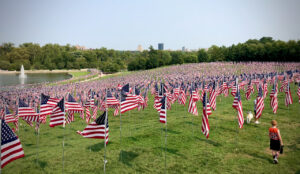
“Flags of Valor,” a memorial outside the St. Louis Art Museum, September 11, 2021. Photo by John Griswold.
When 9-11 happened I was teaching at the University of Illinois. My wife was six weeks pregnant with our first son. We were getting ready for work but stopped to watch the Towers fall on TV, as most of the rest of the world did, and wondered what it all meant. You probably remember that for some time there were hopes that people had survived the fall, and that we had not yet heard the names Osama Bin Laden or Mohamed Atta.
The university told us to devote classes to helping students process their shock, anger, and grief. By 9-12 most of my students were tired of the atmosphere of “rap sessions”—what could be said definitively anyway?—and wanted to normalize things by getting on with the lesson. We were reading Melville, and they did a great job with it but wondered in passing at his narrator walking in the yard of Trinity Church, where it was reported a radio mast from one of the Towers had fallen and stuck in the ground like a spear. A couple of students shouted and shook with rage, and one called whoever attacked “us” “cowards.”
As I wrote later about that time, “I wasn’t thinking, just responding, and said whoever they were, they were mass murderers, but was it an act of cowardice to strap yourself into a jumbo jet laden with 24,000 gallons of aviation fuel and fly it into a skyscraper? It’s a measure of my own alienation that I worried for my little adjunct job with that comment until Susan Sontag wrote in the September 24th issue of The New Yorker, ‘In the matter of courage (a morally neutral virtue): whatever may be said of the perpetrators of Tuesday’s slaughter, they were not cowards.’”
Twenty years on, 9-11 is still a fraught topic, one of the few still mostly forbidden to jokes, for instance, though an episode of The Office once had new boss Will Ferrell fail at practicing to host an office awards ceremony by turning to an employee in the manner of a standup comedian and asking, “Where were you on September 11th?” The old boss, Steve Carrell, takes him to the bathroom and slaps him hard.
After 20 years, the topic is riven with both the sickeningly unreal (conspiracy theories) and the disgustingly real (20 years of associated wars). Both are symptomatic of a failure to process what happened. My younger son’s high school classes devoted time to the anniversary this week, and America’s Heartland Remembers, a nonprofit, installed more than 7,000 large American flags outside the St. Louis Art Museum to represent all first responders killed in 9-11, and all the “service members who have been lost in theater since 9/11/2001 in the War on Terror.” The memorial is called “Flags of Valor.” Neither, from what I can tell, were nuanced approaches.
I hear the failure to process in our heightened political rhetoric, all those with-us-or-against-us slogans, and see it in our reduced confidence in our own processes and our status in the world. It, the failure, is in our economy, our infrastructure and services, and our culture(s).
I have always been bothered by Eliot’s line, in “Prufrock,” “In a minute there is time / For decisions and revisions which a minute will reverse.” This is almost always a lie. In the case of 9-11, mostly insignificant men decided to take a few relatively easy steps and changed things irrevocably. There were not even any guns. They did not need them. They used our systems against us, and we built on that with how we responded to the event.
The war has ended just in time for this anniversary, but what can be said definitively of that either? When?
